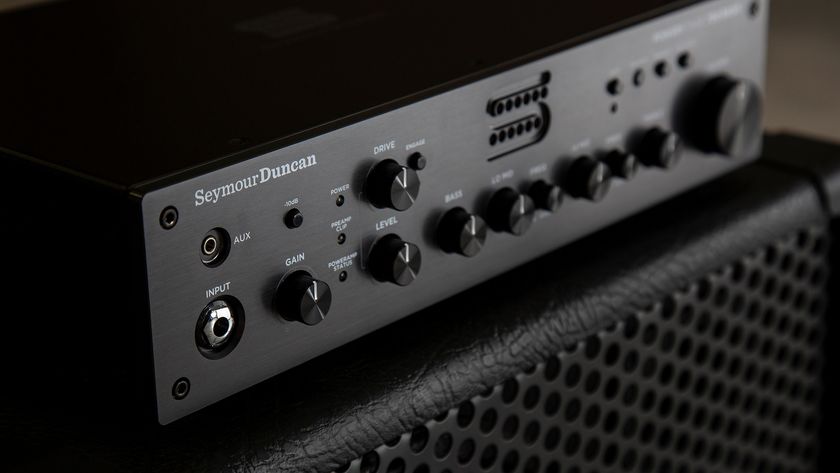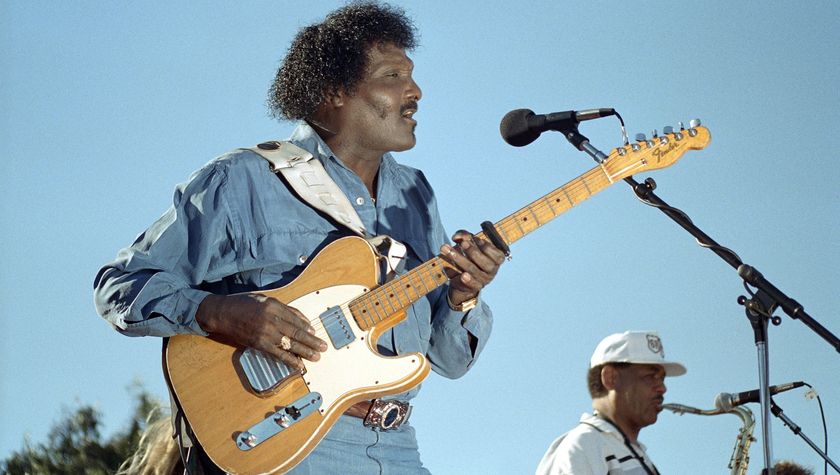Carmen Vandenberg: “I want to be the kind of guitarist who can do a show with nothing – just an amp and a guitar. But I'm a geek, and I love pedals!”
One half of UK rock outfit Bones UK talks skateboarding accidents, her love of effects, and her brand-new signature Blackstar combo
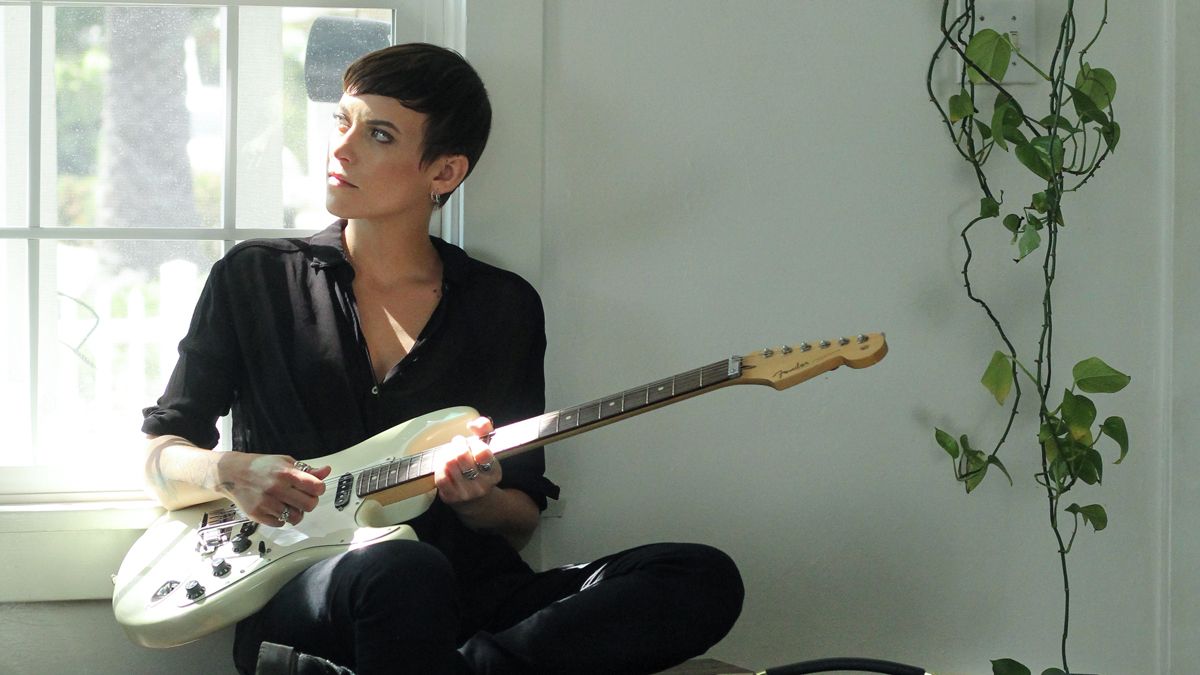
Carmen Vandenberg is no different to the rest of us. The Jeff Beck and Bones UK guitarist had a topsy turvy 2020, but unlike most, she even had to take a leave of absence from her electric guitar after taking a tumble in a skateboarding accident.
“I was laughing when it happened,” she says. “I have literally spent half of my life doing crazy stunts on stages, jumping into audiences. The day before I broke it, I climbed a mountain of 8,000ft, with sheer drops of 100ft, without the right equipment, and then here I am, just on my street, skateboarding with my neighbors' kids and I break my arm.”
2021 finds her in better fettle. She is out of her cast, almost healed, and playing guitar again. “The beautiful thing was that I started playing blues again, which I hadn’t done for a while,” she says. “I started back with the things that had initially inspired me to play guitar.”
Sometimes you have to go back to the source. Vandenberg’s return to blues fundamentals goes way back to when big, expressive players with big expressive personalities such as SRV, Hendrix, Albert Collins, “all the Kings,” lit the flame. Prince, too.
Another source of inspiration, and the reason why she joins us on a Zoom call from California, is that her signature guitar amplifier, the CV30, has just been unveiled by Blackstar, and it's pretty special.
A limited edition 30-watt tube combo, the CV30 is arguably the quintessential Blackstar amplifier, in that it offers the dynamics of a US amp with the bright, chime and character reminiscent of classic British Class A tube amp designs.
Under the hood there are a pair of ECC83s in the preamp, a dual-6L6-driven power section, EC and a single Celestion 12” speaker. With its custom retro vinyl covering and art deco control panel, the CV30 is one smart looking amp.
Get The Pick Newsletter
All the latest guitar news, interviews, lessons, reviews, deals and more, direct to your inbox!
Limited to 130 units worldwide, each comes with a signed certificate of authenticity from Vandenberg herself.
The CV30’s arrival has an almost poetic timing, with Vandenberg returning to the fundamentals, here is an amp that’s voiced for her style, offering a sort of tonal base camp for hunting more off-the-grid sounds.
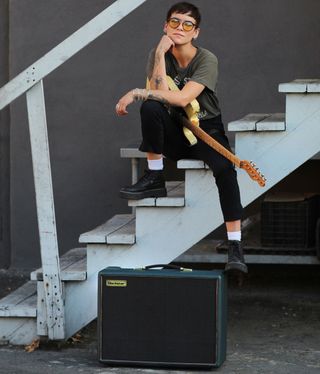
How did this idea for a signature amp come about?
“This whole thing has been a whirlwind experience. It is a dream that I have never even dreamed about. It is one of those things that I would never have expected to have happened. I have been working with Blackstar since 2017. I had been playing the Artist 30, and then when they called to say they wanted to do a signature amp I was beyond overwhelmed.”
It’s funny, when you start playing, it is all about the guitar. But as you get more experienced, finding the right amplifier consumes you.
“I completely agree. When you're younger, you just think about the guitar. That is what's important. How it looks. How it feels. As you progress as a player, the tone becomes equally if not more important. So it’s one thing of how it feels, how it allows you to play, and this is what actually puts out your sound, so the tone becomes more important.”
No one needs a whole wall of amps. Normally it's just one and it's mic’d up
How does a conversation about a signature amp go? Did you talk circuits and whatnot?
“I think Blackstar gets the credit for that because the whole team of engineers listened to my tone, and what I loved about the Artist 30 that I had been playing for the last couple of years. Then they basically took my style, my tone, and had a version of what they thought I would like ready for me. It was incredible. When I went to Northampton and tried it for the first time, it was spot-on.”
Did you change much?
“We changed a few things. We tried different speakers. We tweaked a few things, the brightness and whatnot, and then I made some adjustments to the second channel having more gain. But it was them doing most of the work, knowing what I liked and then just making it happen.”
It feels like very much the age of the tube combo, and with stage volumes getting regulated, the smaller the better.
“First of all, an amp always sounds better when you are pushing it, cranking it up. No-one needs a whole wall of amps. Normally it's just one and it's mic’d up. And this thing is just so fucking loud! [Laughs]
“I do get in trouble sometimes for having the volume too loud onstage. I’ll play with two amps on and A/B them. I’ll EQ them differently, one with a bit less gain, one with a bit more, and it just makes your sound a bit rounder. I like having two amps onstage.”
You have got light and dark reverb on the amp. What is the thinking there? Is that dark option to help round off the brightness in your Tele?
“I think every amp should have a reverb unit. If you want to play blues, and want to take just one amp, no pedalboard, it needs to have it. But the brightness thing, when I play the Tele it is for Bones, and not much of my sound has reverb on it. I have the footswitch so I can grab it if I need it for a song.
“The Telecaster does need a little bit of brightness rounded off. [But] I’ll have it on mainly when I play the Strat. That adds the warm sound. With the Tele, I need the cutting sound…”
Of course, the dagger to poke through the mix.
“Oh yeah, it’s piercing sometimes. That’s why I keep the bass turned up, really high up.”
How important are the dynamics?
“This amp is so clear. It is much more crisp and clear than the Artist 30 I had. Every little nuance and detail is audible. It’s beautiful. It’s like one of those amps that made me want to practice more as soon as I got it because it is so crisp and clear and beautiful.”
You want to be the kind of guitarist who can do the show with nothing, with just an amp and a guitar. But I am a geek, and I love pedals!
That’s a two-way street, because you’ve got to be on-point with your playing.
“Exactly, that’s the thing. You can build your sound with a fuzz or distortion and naturally that hides a lot of things, the more you add. But I do think that the base sound of every amp should be crisp and clear, then you can build on it.
“If you hide from the source, then how are you ever going to achieve anything? You need to have that clean slate. I think the foundation of the sound is the main thing, and that is what we worked on with this amp.”
What do you have on your pedalboard these days?
“I have got so many different options. I’ve got a studio pedalboard, then I have the Bones pedalboard, but it keeps on changing. The thing about pedals is that you want to have the options and you want to have a sound.
“For the project that Bones is, you need that, because we worked on finding new guitar sounds and it is part of it. For my other stuff, I could just bring my amp and that is it.
“My passion is blues. You want to be the kind of guitarist who can do the show with nothing, with just an amp and a guitar. But I am a geek, and I love pedals! [Laughs] I love experimenting with pedals, and that is a lot of what we are diving into for this next record, because I don’t want to copy myself and what I did on the first album. Everyday I am trying to discover new things and invent new sounds.”
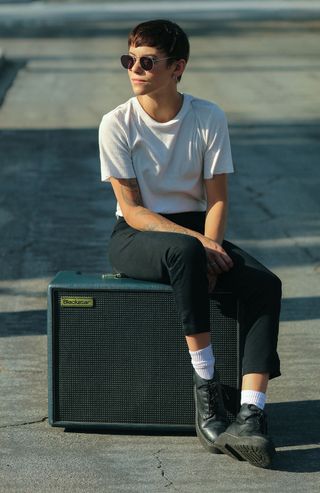
Have you made any good effects discoveries lately?
“Oh yeah, EarthQuaker Devices are amazing and they just sent me some pedals. There is one called the Data Corrupter, and it is like a beast that you have to learn how to tame. I haven’t got my head around it yet, but it’s challenging, it’s interesting, and it makes you play differently.
“When you hear those sounds, and what you are playing is being messed up by something else, it makes you go in different directions. I think that is what is interesting about pedals; it brings you to places where you wouldn’t have naturally gone to.”
Totally, it shifts the context of the sound and makes you play new things.
“Yeah, exactly. And then I have one that’s called the Organizer, and it is like a synth. It is extremely interesting, it’s fun. The most interesting thing is trying to do something that you haven’t heard yet.
The most interesting thing is trying to do something that you haven’t heard yet. But that is just a challenge and, 99 per cent of the time it's a miss because someone has done it before
“But that is just a challenge and, 99 per cent of the time it is a miss because someone has done it before. We had the luck and pleasure to support Tom Morello last year, and you hear things like, ‘What the hell is that? Is that even a guitar?’ He is a genius with that stuff.”
It is a magic show with him. But is a question of, first, finding these tones, but then the genius lies in finding the musical purpose for them.
“It's like what we were talking about before, a lot of this stuff can hide a lot of the playing. So much of the time we work on too much of the sound and then we forget about the actual riff, or the actual part. The thing is: the part has to sound nice with nothing, and then you can add the pedals.
“It's a funny thing. Sometimes you need them, the different options of sound to create something different, but the riff itself, the part itself, has to be good without it, because otherwise we can all hide behind a bunch of sounds.
“Like what I was saying before about the Data Corrupter being a beast that you have to tame, because I don’t know what I am doing, if it's just sounding cool and freaky or if it's actually a good part.”
Did you read the manual? And do you think the manual could help?
“No! [Laughs]”
Exactly. No one reads these things. With guitar playing you’ve got Jiminy Cricket on one shoulder saying to be disciplined with your songwriting, on the other the devil’s saying to break the rules.
“Yeah, exactly it is about finding a balance and it is different for everyone.”
Have you been writing?
“Yes. I was in the cast for a while, and I am getting inspiration, getting into it again. I did struggle this year with everything happening, and what has really affected me – and a lot of musicians – is the lack of shows, which isn’t just us as entertainers giving, it is also us receiving. That’s my nutrition.
“Those smiles, and the audience’s faces and joy, is what fills my batteries and without that – I felt a bit lost last year. And with everything else that was going on in the world, I lost that incentive to write, and I am getting it back. This has been a huge inspiration and a push, the amp! You can dwell in self-pity for a little bit but then you have got to get out of it.”
I think everyone can allow themselves some self-pity right now and that’s okay.
Those smiles, and the audience’s faces and joy, is what fills my batteries and without that – I felt a bit lost last year
“Yeah, exactly. That’s when I realized I was getting so hung up on feeling even worse because I was feeling bad, and then you just have to realize that, hey, everybody is feeling like this, so how can I get out of it? How can I help my community? How can I change some things, and then, little by little, you start playing and performing again. There is no point in getting too hung up on it. If you can’t create, take a moment and then try again.”
The concept of having plans has depreciated in the past year but what’s next for you, recording?
“Yeah, with Bones we have been doing these shows in the face of adversity, how we can do a show with everything that is happening and social distancing, keeping everything safe – so there is some of that coming up. And then we are going into the studio to start recording.
“We don’t know exactly where just yet, because everybody is all over the place, but we are going to do a record. There are some tours booked towards the end of the year. It’s really hard to plan these days. You can’t get your hopes up. We just have to see how everything goes, day by day.”
- For more information on the CV30, head to Blackstar Amps.
Jonathan Horsley has been writing about guitars since 2005, playing them since 1990, and regularly contributes to publications including Guitar World, MusicRadar and Total Guitar. He uses Jazz III nylon picks, 10s during the week, 9s at the weekend, and shamefully still struggles with rhythm figure one of Van Halen’s Panama.
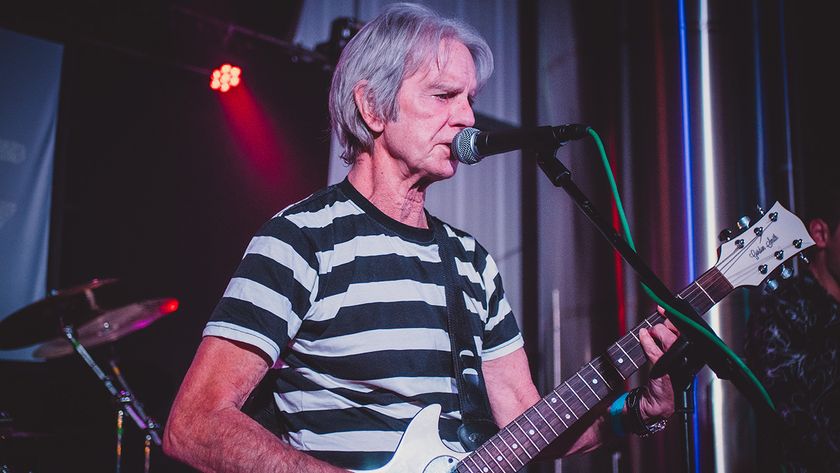
“I get asked, ‘What’s it like being a one-hit wonder?’ I say, ‘It’s better than being a no-hit wonder!’” The Vapors’ hit Turning Japanese was born at 4AM, but came to life when two guitarists were stuck into the same booth
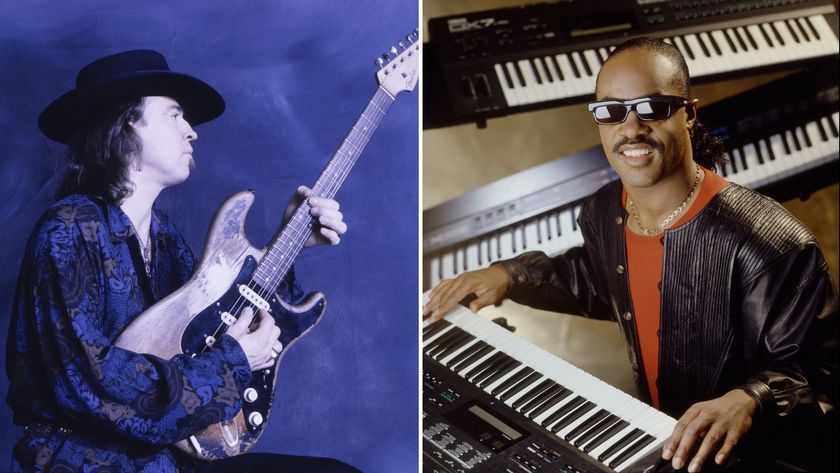
“Let's play... you start it off now, Stevie”: That time Stevie Wonder jammed with Stevie Ray Vaughan... and played SRV's number one Strat



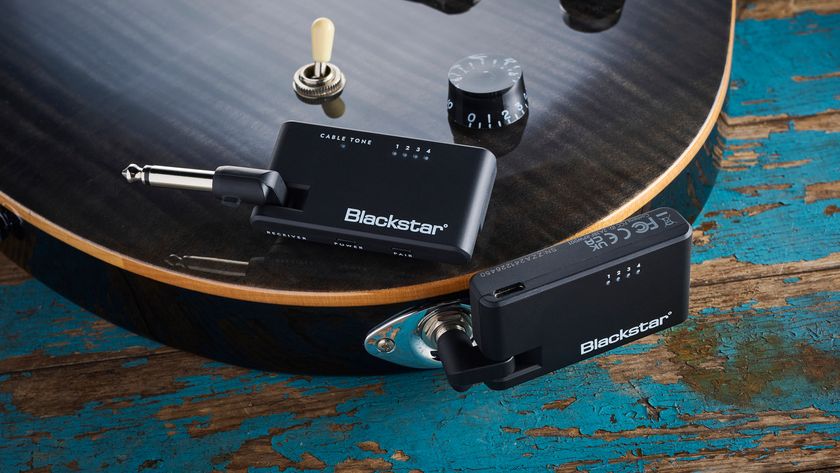
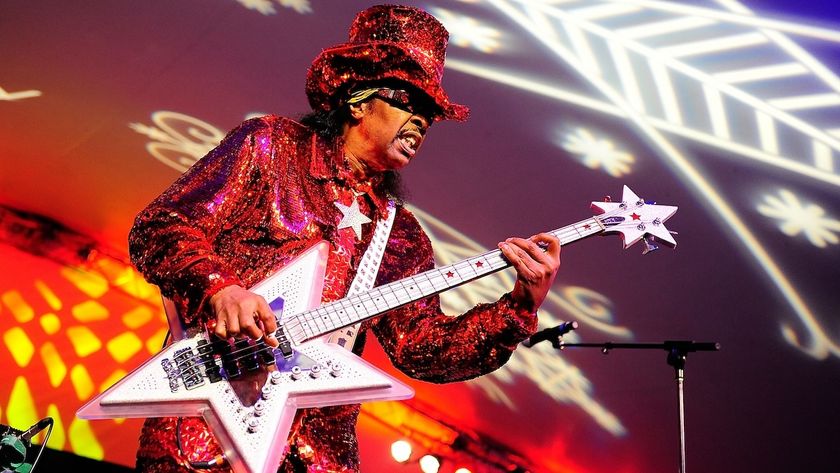
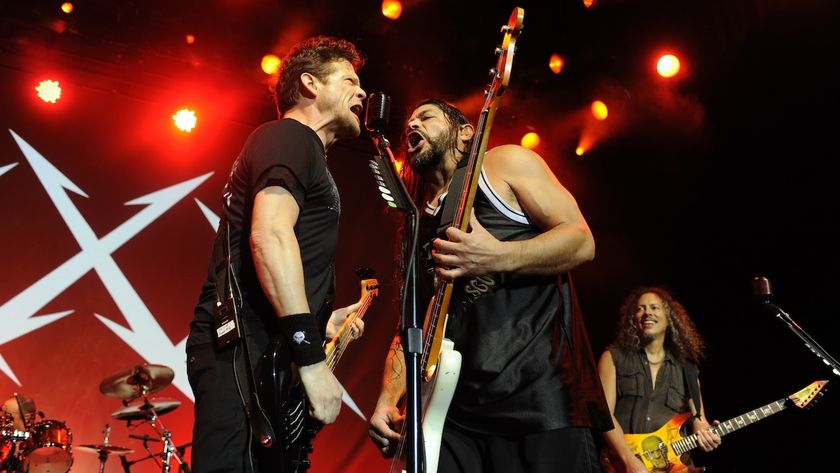
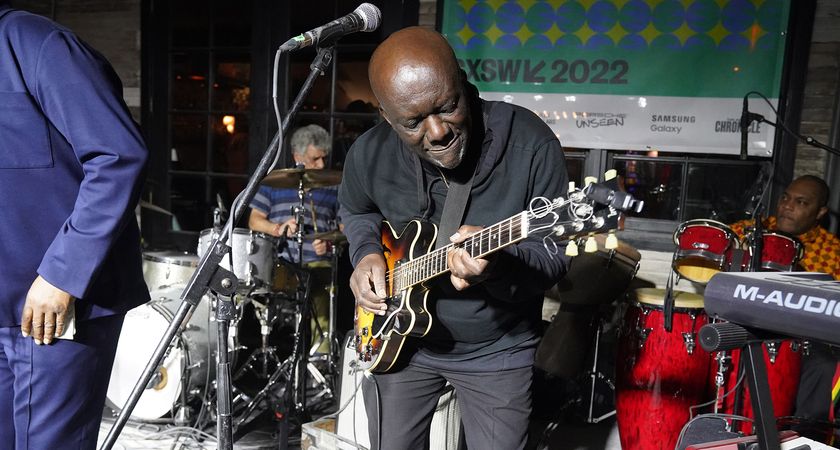
![[L-R] George Harrison, Aashish Khan and John Barham collaborate in the studio](https://cdn.mos.cms.futurecdn.net/VANJajEM56nLiJATg4P5Po-840-80.jpg)
